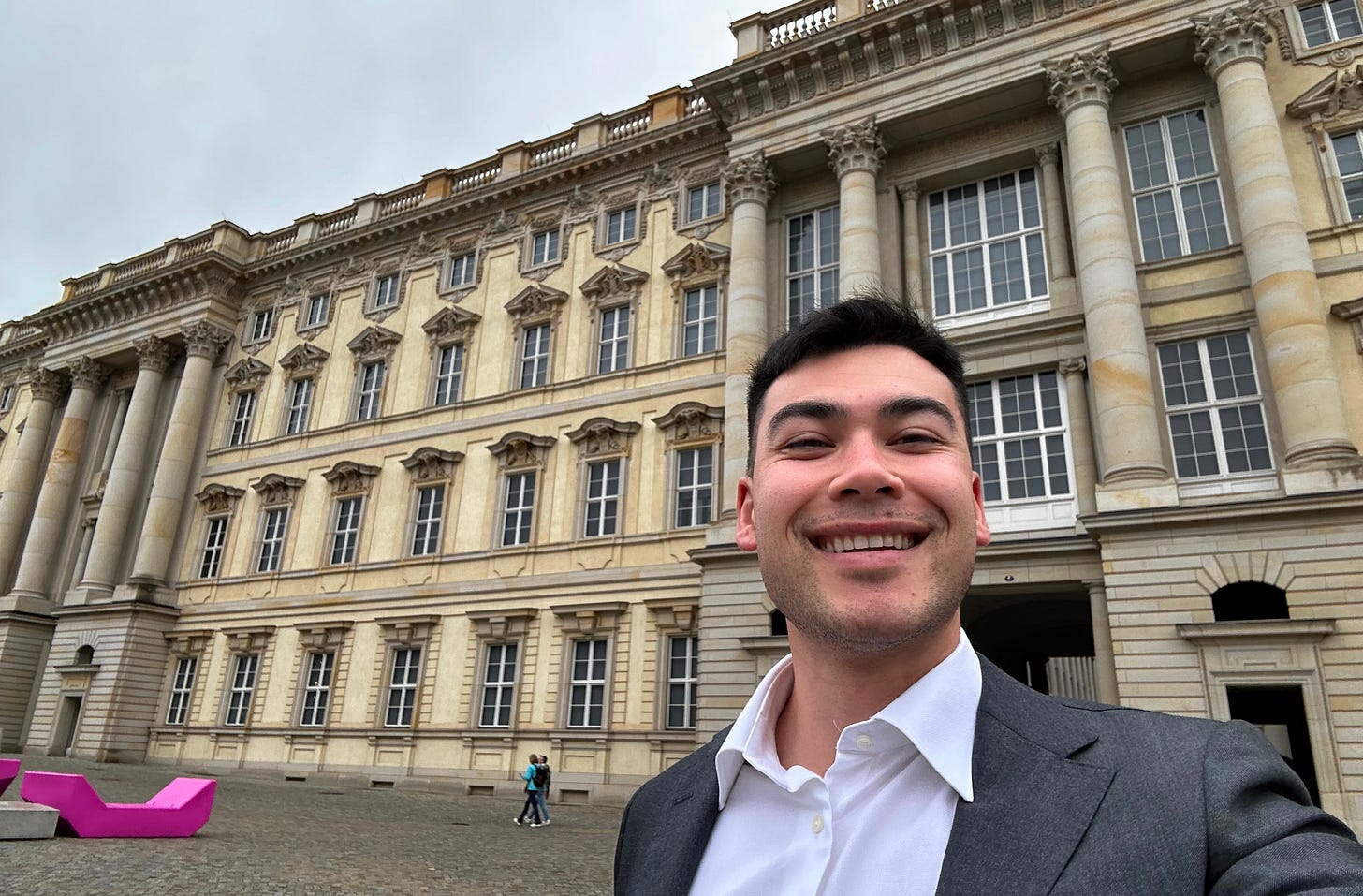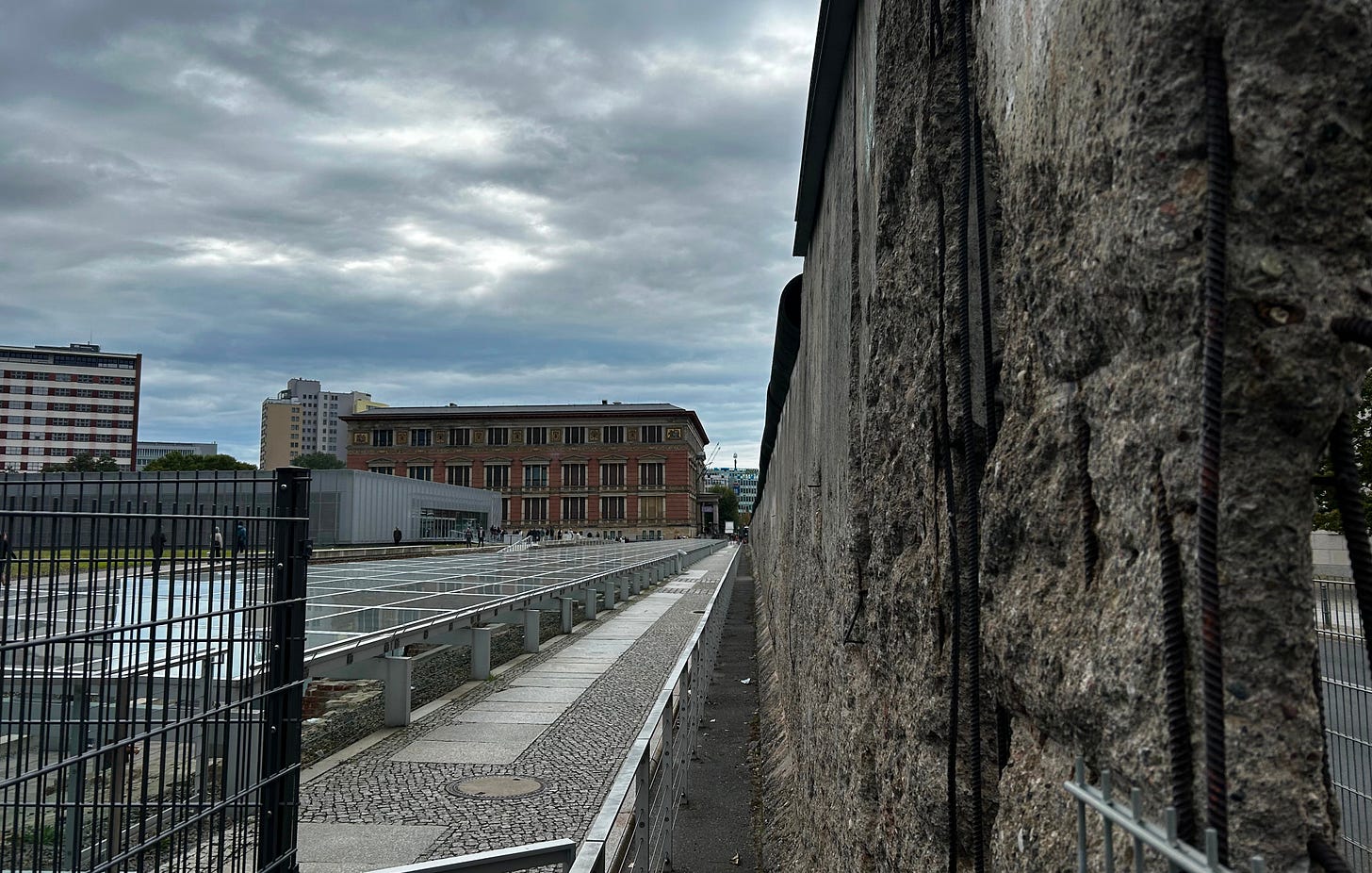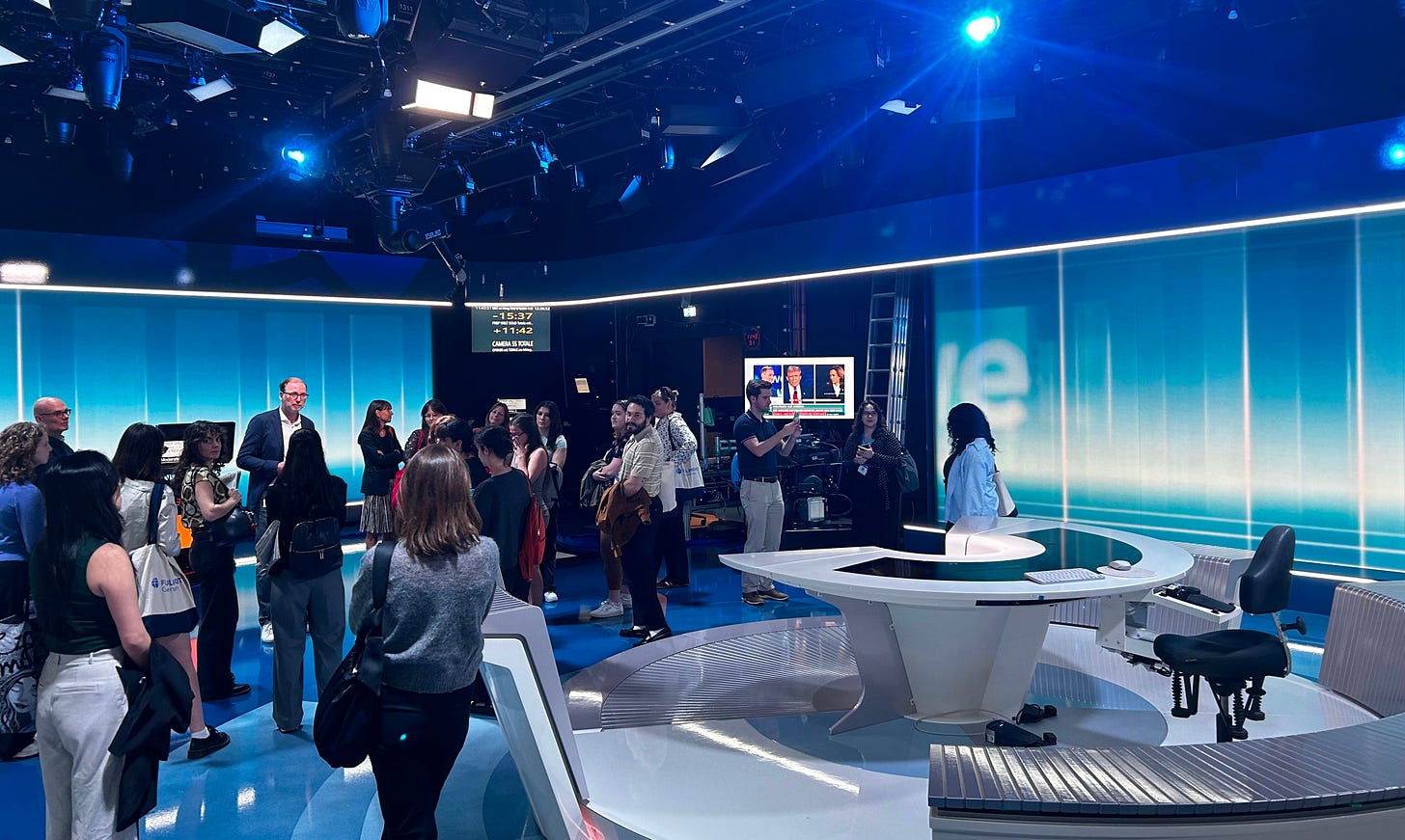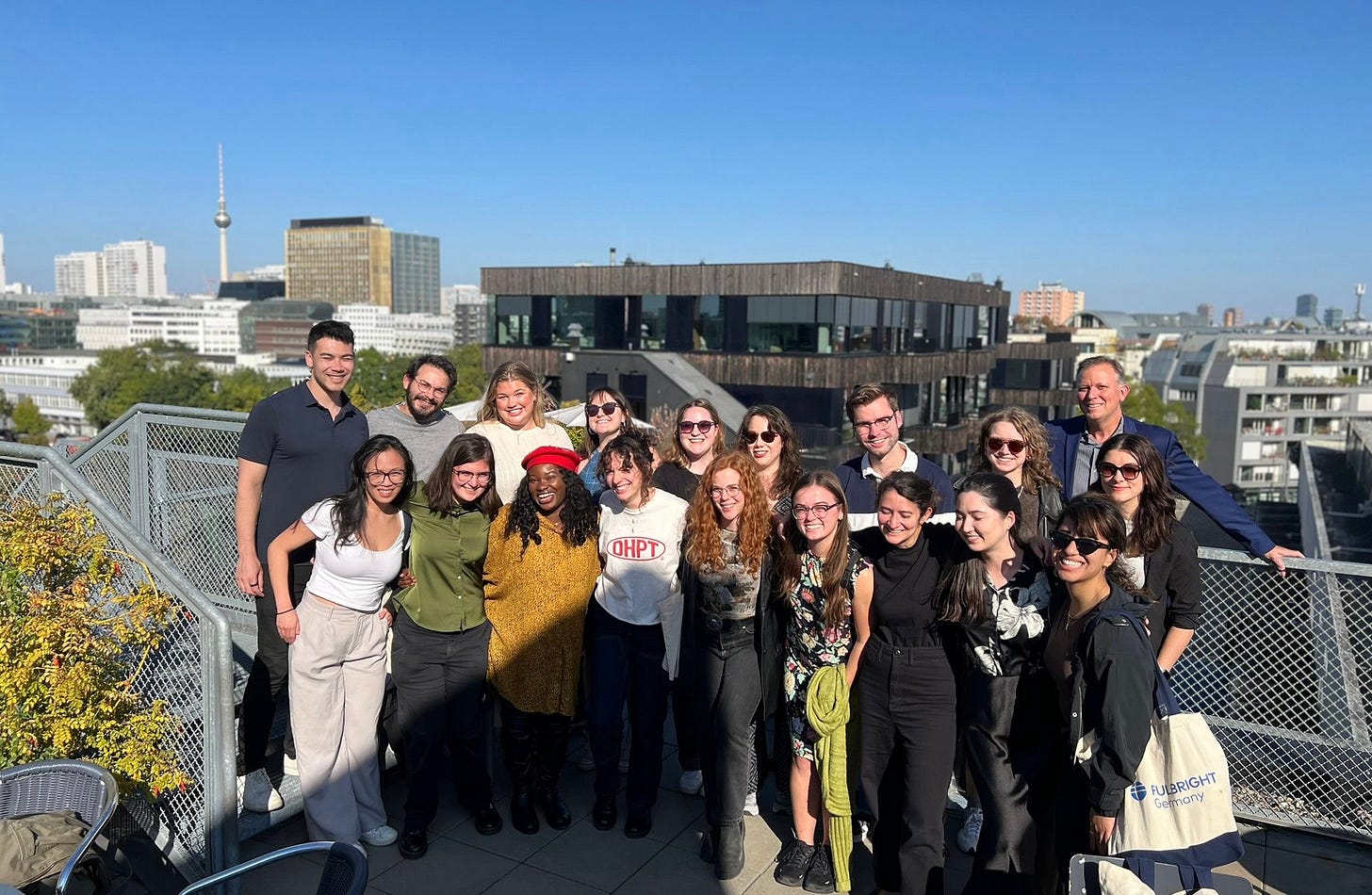
Takeaways from Fulbright Germany
Completing a media fellowship in Berlin while running a startup is no recipe for sleep.
Adrenaline kept me awake the entire flight from New York to Berlin.
If I’d known how little sleep I would get for the duration of the Fulbright program I would have tried harder to keep my eyes closed.
Five of the 18 US journalists who won the award were on the same red-eye that arrived Saturday, September 14.
We each became fast friends as we spent seven days living in the same hotel and sharing meals in between meetings with policymakers, German media executives and local reporters.
Today I’m sharing my takeaways from Fulbright’s Berlin Capital Program, which runs every two years, focusing on the city’s history and how German and US media compare.
For context: The Fulbright name holds a certain gravity in political, media and academic circles.
Many alumni go on to serve as lawmakers and heads of state. Others have subsequently received the Pulitzer and Nobel Prize.
It’s a touch more Ivory Tower than I’m used to these days as a startup founder, but it’s good company to keep in any case.
Nostalgia hangs heavy
In Berlin, the tourists want to see history and the locals work hard not to forget it.
More than once I heard someone say, “Berlin history is world history.” Indeed, no city proved more consequential in the 20th century than the capital of Germany.
Holocaust remembrance looms large. The government has not only maintained many of the haunting, tragic sites of the past, but it’s erected new monuments in their honor — often in the thick of the city.
You run into history whether you look for it or not.
Germany surrounded its Holocaust Memorial, for example, with shops, apartments, and grocery stores.
The grounds of Hitler’s bunker sits around the corner from a Holiday Inn.
Remembrance in Berlin has as much a place in day-to-day life as what you have for lunch.
The weight of the past is quietly evident in the city’s architecture. Buildings that survived the 20th century are still peppered with visible bullet holes, while Nazi-era lampposts illuminate pedestrian boulevards to this day.
“Berlin is not a beautiful city,” one tour guide told our group. “Nothing fits.”
The grand and imperial architecture of prior centuries now clashes with the more functional and severe post-war buildings.
In walking Berlin, our group crossed a thin cobblestone line in the ground on a daily basis. This we learned traces where the Berlin Wall stood for nearly three decades up to 1989.
Only small stretches of the wall remain intact.
Like everything else in Berlin, the nearly 100 miles of cobblestone serve as a constant reminder of how different things once were.
German vs. US media
In visiting the headquarters for the largest media organizations in Germany — including Axel Springer, which owns innumerable German papers and networks as well as Business Insider, Politico and Morning Brew — I observed two ways Germany’s media landscape is more developed than that of the US.
A more willing embrace of technology
A more fractured political spectrum
The first point centers on Axel Springer, which boasts the most modern and impressive workplace I have ever seen.

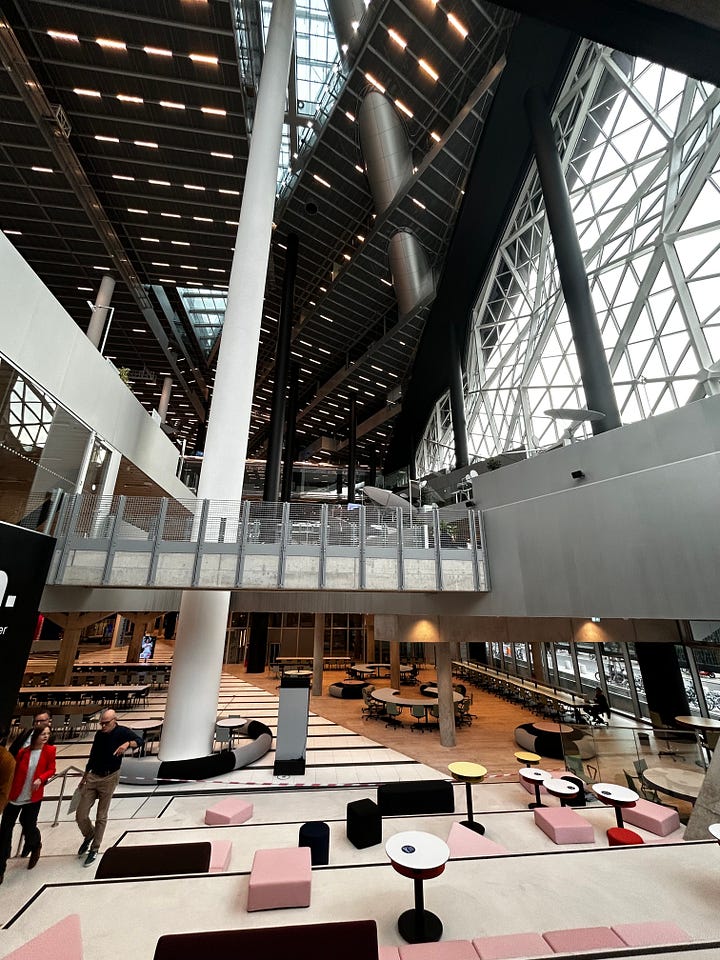
Granted, the company is more of a conglomerate.
It’s arguably a couple acquisitions away from a monopoly.
An editor for one of Axel’s papers, WELT, told us they used artificial intelligence to organize and design each edition of the print paper.
The editorial team also has access to an AI tool it designed in-house. In 2023 this paper became the first German media brand to provide a news plugin for ChatGPT.
Media executives and reporters I’ve spoke to in the US, on the other hand, are hesitant to test — let alone embrace — AI in newsrooms.
The kicker for me was touring Axel’s AI-powered production studio.
The news anchor sits alone in an empty studio while the cameras, lighting, and graphics are all directed by a pre-programmed AI.
No cameramen or producers on set.
While I took this as stunning innovation, some of my colleagues saw this as a troubling example of AI making once-necessary jobs obsolete.
To the second point, Germany has several more relevant political parties than the US. This to me makes the news landscape more robust compared to the binary left-right dynamic in America.
While each of the handful of German parties exist along a left-right spectrum, my sense was that the variety forces outlets to be more nuanced and less bombastic in their reporting.
When an organization has to cater to a more politically-fractured base of readers, coverage must be more precise.
Broad-brush language and tropes deter rather than attract.
In the US, by contrast, partisan news coverage caters to the lowest common denominator. Reporting here often resembles a race to the bottom.
What many of my peers and I took as the biggest pitfall of German media was their habit of “quote control.”
There is an understanding between journalists and their sources that the interviewee has the ability to review, edit or delete their own quotes in an article before it publishes.
“On-the-record" is not so black-and-white in Germany.
A long-time New York Times correspondent based in Berlin told us that quote control irks her, yet it is an immutable characteristic of German media.
She said it is not unusual for sources — including high-ranking politicians — to turn down interview requests if they are not granted quote control.
I worked nights all week
I arrived in Berlin much like my peers: A curious journalist looking to better understand the German perspective on media.
However, as the group wrapped up each day around 10 PM, that’s when I’d start work.
Every night of the week-long program, I’d write my financial newsletter, Opening Bell Daily, until about 2:30 in the morning.
As the only member of the group running my own business, I hadn’t clocked out for the week.
I didn’t get more than four hours of sleep on any given night, as each day commenced around 7 AM in the hotel lobby.
Thanks to the adrenaline, abundant cappuccinos, schnitzel and pretzels I didn’t fall asleep during any of our daytime programming.
Soon, I’ll have more to share from the second half of my trip, which took me to Frankfurt, Florence and Rome.
Talk to you later this week.
— Phil Rosen, co-founder and editor-in-chief of Opening Bell Daily







